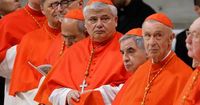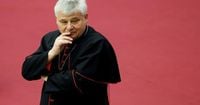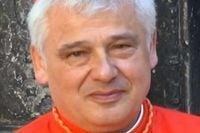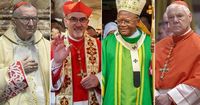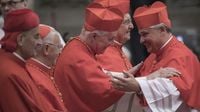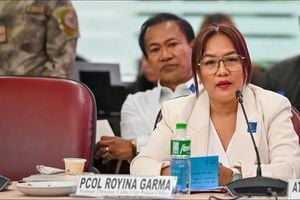As the Catholic Church mourns the passing of Pope Francis, all eyes are on the Vatican, where preparations for the upcoming conclave are underway. Scheduled to begin between May 5 and May 10, 2025, this pivotal gathering of cardinals will determine the next leader of the Church. Among the potential successors, Cardinal Konrad Krajewski, often referred to as the "Robin Hood of the Vatican," is emerging as a notable contender.
Cardinal Krajewski, who has served as the Papal Almoner since 2013, is known for his unconventional approach to charity and outreach to the marginalized. Born in 1963 in Łódź, Poland, Krajewski was ordained a priest at the age of 25. His theological education included studies at the Catholic University of Lublin and the Pontifical Lateran University in Rome, where he earned a doctorate in liturgy. His journey in the Vatican began in 1998 when he became a Papal Master of Ceremonies, a role that allowed him to work closely with popes John Paul II, Benedict XVI, and Francis.
Since his appointment as Papal Almoner, Krajewski has gained a reputation for his hands-on approach to helping the poor and homeless. He is well-known for personally distributing food and supplies to those in need, often driving around Rome in his Fiat. In a striking example of his commitment, he once reconnected electricity to a building occupied by homeless individuals, an act that earned him the nickname "cardinal electrician." This audacious move, while controversial, showcased his dedication to serving the most vulnerable in society.
During the COVID-19 pandemic, Krajewski's efforts intensified as he organized food deliveries and provided masks to those in dire situations. His proactive stance has resonated with many Catholics around the world, who see him as embodying the spirit of Francis, the late pope known for his focus on poverty and social justice.
However, Krajewski's candidacy is not without challenges. While he is viewed as a potential compromise candidate who could continue Francis's legacy, his lack of experience as a diocesan bishop raises concerns among some cardinals. As noted by journalist John L. Allen Jr., Krajewski's charisma and courage are commendable, but his outsider status may hinder his chances in the conclave.
The conclave will include four Polish cardinals: Krajewski, Kazimierz Nycz, Grzegorz Ryś, and Stanisław Ryłko. Each brings a unique perspective to the gathering, but Krajewski's reputation as Francis's "right hand" in charitable works sets him apart. His unwavering commitment to the marginalized has earned him admiration, yet he remains an underdog in the race for the papacy.
Other prominent candidates include Cardinal Pietro Parolin, the Vatican Secretary of State, who is currently seen as the frontrunner. Parolin's extensive diplomatic experience and close relationship with Francis position him as a strong candidate to lead the Church in a complex global landscape. At 70 years old, he has been a key advisor to Francis and has served in various diplomatic roles, including in Nigeria and Mexico.
Cardinal Matteo Maria Zuppi, the Archbishop of Bologna, is also in the mix, known for his commitment to interfaith dialogue and peace initiatives. His pastoral approach aligns with the reformist vision of Francis, making him another candidate to watch. Meanwhile, Cardinal Luis Antonio Tagle from the Philippines, known for his charismatic personality and social engagement, also remains a contender.
As the conclave approaches, discussions around the future direction of the Church intensify. Will the cardinals choose to continue the reforms championed by Francis, or will they opt for a more conservative approach? The stakes are high, as the new pope will shape the Church's response to pressing global issues, including poverty, migration, and social justice.
Krajewski's candidacy symbolizes a potential shift towards a more inclusive and compassionate Church. His actions reflect a commitment to living out the Gospel in practical ways, resonating with many who seek a leader willing to challenge the status quo. However, the decision ultimately lies in the hands of the cardinals, who must weigh the various perspectives and priorities represented within the Church.
In the coming weeks, as the world watches and waits, the conclave will not only decide who will lead the Catholic Church but also what kind of Church it will be in the years to come. Whether Krajewski emerges as the new pope or not, his influence on the Church's approach to charity and social justice is already being felt, marking him as a significant figure in this pivotal moment in history.
